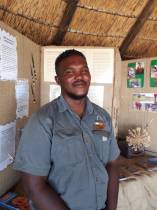BACKGROUND
Flower season is upon us again and visitors from all over the world flock to Namaqualand to admire this annual event, returning home with thousands of photographs and good memories of their experiences. Photos can never replace the actual experience of being there and allowing your senses to absorb this miracle of life.
NAMAQUALAND PLANT SPECIES – WHY ARE THEY SPECIAL?
Many of the plants are really, really tiny – no larger than the tip of your little finger. Others are rather extravagant in their size and colour. However, they all share one thing in common. Over thousands of years, they have all magnificently adapted to the harsh Namaqualand climes. Such is their adaptation that many of our plant species are endemic (occurring only here and nowhere else in the country or the world). Because these plants are so well adapted to very specific habitats, many of them are also rare, endangered or even critically endangered.
PLANT POACHING FEEDS HUMAN GREED
And now the story gets ugly. Human greed and Man’s obsession to own rare things has led to a surge in plant poaching. Where do plant poachers gravitate to when looking for rare specimens? Naturally Namaqualand, with its high endemism, is a paradise for these ruthless environmental thugs. Posing as tourists coming to enjoy the flowers, these collectors rape and pillage without a thought beyond wanting this special plant in their personal collection.
WHAT DOES THE LAW SAY?
Let’s be clear on what the law says:
It is illegal to destroy, disturb or remove indigenous plants or any parts thereof. Collecting seed-heads or cuttings or an entire plant is a criminal offence which can land one in jail and/or with a hefty fine and a criminal record.
I often hear the argument that the production of these plants in nurseries and gardens is a way of conserving them, but consider the following:
· Most smuggled plants die in transit anyway
· Smuggling plants leads to the spreading of plant pathogens and diseases - the repercussions of which we have no clue. South African plants are adapted to South African conditions and there is a balance in nature that keeps everything under control. A smuggled plant might be harbouring mould spores or other pathogens which, let loose in an environment with no natural controls, can wreak havoc in its new environment
· Nurserymen are fond of hybridizing and genetically manipulating for larger flowers, unusual foliage colour/shape or whatever their interest is. These hybrids are of no use to nature – in fact they are a threat to the original plant
· Poachers do not EVER have the environment in mind. It’s a money game. Unadulterated greed.
WHY DOES THIS MATTER TO EACH OF US?
If you are in possession of protected plants, you need a permit and proof of purchase. Genetic testing will quickly show up the origin of the plant i.e. whether it comes from a nursery and/or was taken out of habitat. When purchasing a protected plant you need to make sure that the nursery has the necessary permits.
In South Africa, plants may not cross provincial borders without an export permit from the one province and an import permit from the other.
It may seem to you that “just this one little plant/cutting is not going to destroy Namaqualand”, but think again. If everyone thought this way, then it certainly would. By smuggling plants - whether for your own collection or for the black market - you are perpetuating a problem. Face it, we all tend to be hypocrites in some areas of our lives, “I’ll take a chance with this cutting, but I hate litterbugs”, “I’m dead against rhino poaching, but I want this plant for my rockery” – I’m sure that you can think of many more examples of Man’s selective morality.
Years of devastating drought have put our flora and fauna under enormous strain. Many hardy, drought-resistant species have clung to life but lost the battle, others have barely survived. Our floral kingdom now faces a horrifying surge in poaching. The primarily Asian demand for rare possessions is a serious threat to our fragile biodiversity and we need everyone’s support in this battle.
What to do if you suspect plant poaching:
· Report suspicious activity to lodge management and the following immediately:
Ø 082-492-8291 or 082-560-8700 or 083-264-2223 (Phone, sms or Whatsapp)
· You may remain anonymous. Dialling 10111 from anywhere in South Africa puts you through to the police station nearest to you.
· Try to get vehicle registration number and description. Any additional information but only do this if you can do so discreetly.
· Never try to intervene or confront these people. Confrontation may put your life at risk – remember you could be dealing with seasoned criminals.
· Another reason to avoid confronting suspected poachers is that by doing so, you are alerting them to the fact that they have been seen. This gives them time to get away – only to be able to continue with their criminal activities elsewhere. Report suspected illegal activity immediately and allow the law enforcement officers deal with them so that we can be assured of their arrest and prosecution.
Help us to protect our environment. We in South Africa are all too aware of what is happening to our rhino population. Plants, however, do not cause such a stir and people tend to be far less vociferous and emotional about flora than fauna. We rely on our visitors to report these incidents and we are deeply grateful to those that do. Enjoy a spectacular flower season!





